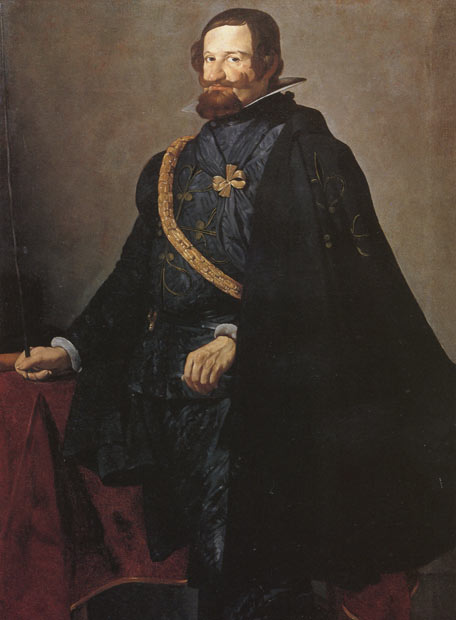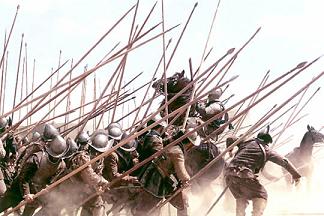
Franco-Spanish War
The biggest enemy Spain had to face in the 17th century were the Dutch. It was really a chosen enemy. According to the Spanish school of thought, they didn't pose any threat to the Iberian integrity as all they wanted was to be freed from the Spanish grip they had been under since Charles V was born.
But Spain didn't want to risk such profitable territories and it wasn't yet ready to admit that its status as a world power was receding. So they waged war against the Dutch for pretty much a century, in a series of conflicts that almost inevitably ended up on a stalemate. This remarkable insistence is largely due to a single man's impossible stubbornness. His name was the Count-Duke of Olivares.

He was King Philip IV's favorite man in the world. The Count Duke was a grandiloquently overweight man with frightful delusions of grandeur. He was both the most efficient and the most inept administrator Spain has ever had. He would wake up at 7 am every morning and work his way through the day until 11 pm. During those hours, he would fail to make any kind of good decision.
He held absolute power on several issues - foreign policy, economy - as the King wouldn't sign anything the Count Duke of Olivares hadn't read first. In fact, the King was kind of relieved that at least somebody was making decisions. Since Spain loved its kings, the people decided to hate the Count-Duke instead, because it was palpably easier.
So while Spain could have perfectly avoided the endless decades of conflict against the Dutch, the Count Duke of Olivares and King Philip IV decided to pursue their victory. In 1621, after losing of hundreds of men and even more hundreds of ducats (the currency of the time), they were immersed in a 12-year truce that could have well been the end of the conflict. But as soon as Spain regained some military muscle, the Count Duke of Olivares decided to attack again and sent his troops to Dutch soil.
Four years of relentless fighting later, they had conquered about one city (Breda, in 1625). Even though they were again immersed in the impossible stalemate that would define this war, Spain seemed to have a certain advantage - they had defeated a Swedish Army in Nordlingen. For the first time in 30 years, the Dutch war's boringly predictable balance had been shaken, however it would be a tough lesson for the Spanish.
France decides to intervene
Anyone who could pose a threat to the Spanish was a friend of French - and the Dutch were a fantastic candidate. They were geographically close, ideologically similar and needed all the help they could get. For years they had been sending money to Spain's opponents -- and now was the time to claim back the investment by acting on the war on their own accord. They trapped in the Spanish forces in the Southern Netherlands by cutting the road that carried supplies for the the troops.

Then they sprang to action. The openly faced -and defeated- the Spaniards in the battle of Rocroi. They excluded Spain from the peace negotiations when the Treaty of Westphalia was negotiated, and secured themselves a bunch of territories, including Alsace (which, by the way, would come back to haunt them in the early 20th century).
Not that this peace treaty put at end to France's belligerence. The French diplomacy was still bent on fighting a very weakened Spain, and, despite inner opposition from the very French nobility, it appeared to be a relatively prosperous investment. They won Arras in 1654, Dunkirk in 1658, and Artois and Roussillon in the ensuing Peace of the Pyrenees.
In the end, the two kingdom's historical enmity was brought to an end by a marriage contract between French king Louis XVI and Spain's Philip IV's daughter, Marie Therese). Wars should be resolved like that more often.
The loss of so many territories and resources meant that Spain had given up on being a Great World Power.
